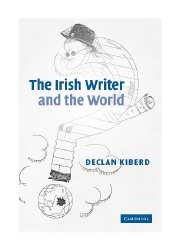Book contents
- Frontmatter
- Contents
- Acknowledgements
- A note on the text
- 1 Introduction
- 2 The fall of the Stage Irishman (1979)
- 3 Storytelling: the Gaelic tradition (1978)
- 4 Writers in quarantine? The case for Irish Studies (1979)
- 5 Synge, Yeats and bardic poetry (2002)
- 6 George Moore's Gaelic lawn party (1979)
- 7 The flowering tree: modern poetry in Irish (1989)
- 8 On national culture (2001)
- 9 White skins, black masks: Celticism and Négritude (1996)
- 10 From nationalism to liberation (1997)
- 11 The war against the past (1988)
- 12 The Elephant of Revolutionary Forgetfulness (1991)
- 13 Reinventing England (1999)
- 14 Museums and learning (2003)
- 15 Joyce's Ellmann, Ellmann's Joyce (1999)
- 16 Multiculturalism and artistic freedom: the strange death of Liberal Europe (1993)
- 17 The Celtic Tiger: a cultural history (2003)
- 18 The city in Irish culture (2002)
- 19 Strangers in their own country: multiculturalism in Ireland (2001)
- Index
- References
9 - White skins, black masks: Celticism and Négritude (1996)
Published online by Cambridge University Press: 22 September 2009
- Frontmatter
- Contents
- Acknowledgements
- A note on the text
- 1 Introduction
- 2 The fall of the Stage Irishman (1979)
- 3 Storytelling: the Gaelic tradition (1978)
- 4 Writers in quarantine? The case for Irish Studies (1979)
- 5 Synge, Yeats and bardic poetry (2002)
- 6 George Moore's Gaelic lawn party (1979)
- 7 The flowering tree: modern poetry in Irish (1989)
- 8 On national culture (2001)
- 9 White skins, black masks: Celticism and Négritude (1996)
- 10 From nationalism to liberation (1997)
- 11 The war against the past (1988)
- 12 The Elephant of Revolutionary Forgetfulness (1991)
- 13 Reinventing England (1999)
- 14 Museums and learning (2003)
- 15 Joyce's Ellmann, Ellmann's Joyce (1999)
- 16 Multiculturalism and artistic freedom: the strange death of Liberal Europe (1993)
- 17 The Celtic Tiger: a cultural history (2003)
- 18 The city in Irish culture (2002)
- 19 Strangers in their own country: multiculturalism in Ireland (2001)
- Index
- References
Summary
The late nineteenth- and early twentieth-century programme of cultural decolonisation in Ireland is an important precursor of a related struggle in Africa more than forty years later. Undoubtedly England's only European colony differed from imperial territories in Africa, most obviously as a result of Ireland's centuries of enforced intimacy with England – an intimacy based on proximity and affinities of climate, temperament and culture. And while Europe's race for empire in Africa occurred in the latter half of the nineteenth century, England had occupied Ireland for more than 700 years. Thus at the time of Irish decolonisation, the imperial culture had penetrated far more deeply than in Africa or Asia. Despite such differences, however, the shapers of modern Africa (as well as India) looked on occasion to Ireland for guidance. But if Ireland once inspired many leaders of the ‘developing world’, today the country has much to learn from them.
In spite of episodic involvement with India's decolonisation, Irish nationalists and writers were slow to identify with other resistance movements, preferring to see their own experiences as unique. Moreover, a strain of white triumphalism, running from John Mitchel to Arthur Griffith, would never countenance Irish solidarity with the anti-imperial struggles of other racial groups. And although many nineteenth-century Irishmen, serving in the British army, had assisted in the conquest of India and Africa, the English colonisers imputed many of the same qualities to natives in these remote territories that they were attributing to the Irish.
- Type
- Chapter
- Information
- The Irish Writer and the World , pp. 133 - 145Publisher: Cambridge University PressPrint publication year: 2005



